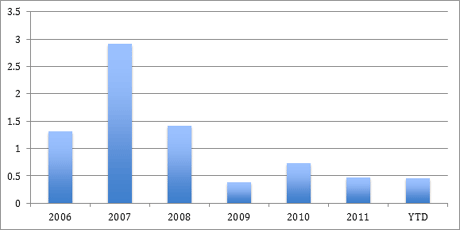It’s time to take profits on Barratt
Housebuilder Barratt Developments has just posted a good set of results, and most City analysts are tipping it as a 'buy'. But the recovery looks priced in, argues Phil Oakley. It’s time to take profits.
Get the latest financial news, insights and expert analysis from our award-winning MoneyWeek team, to help you understand what really matters when it comes to your finances.
You are now subscribed
Your newsletter sign-up was successful
Want to add more newsletters?

Twice daily
MoneyWeek
Get the latest financial news, insights and expert analysis from our award-winning MoneyWeek team, to help you understand what really matters when it comes to your finances.

Four times a week
Look After My Bills
Sign up to our free money-saving newsletter, filled with the latest news and expert advice to help you find the best tips and deals for managing your bills. Start saving today!
Trying to sell houses in a weak economy and tight mortgage market is not easy. So the management team at housebuilder Barratt Developments (LSE: BDEV) should be given credit for doing a good job the news that half-year operating profits rose by 40.5% is an impressive achievement.
The company has certainly learned some hard lessons from the housing boom and bust. It is focused on rebuilding profits, and has become very disciplined in buying land.
Compared to five years ago, it is buying a lot less. And the land it has been buying has been at good prices. That should help boost profits and margins.
MoneyWeek
Subscribe to MoneyWeek today and get your first six magazine issues absolutely FREE

Sign up to Money Morning
Don't miss the latest investment and personal finances news, market analysis, plus money-saving tips with our free twice-daily newsletter
Don't miss the latest investment and personal finances news, market analysis, plus money-saving tips with our free twice-daily newsletter
For example, 38% of its land bank would achieve gross margins of at least 20% at current house prices. This contrasts with Barratt's current gross margins of just over 10%.
So you can see why City analysts expect a rapid recovery in group profits. But is this already reflected in the share price?
Serious risks still remain to the housing market
Rising unemployment and poor availability of mortgage finance means that life for builders will remain tough. Barratt has been steadily increasing its part-exchange deals in order to secure sales. This soaks up cash and increases its exposure to house prices.
Raw material prices are also expected to rise. Barratt says it expects selling prices to grow in low single digits during 2012. It may be able to achieve this by selling more expensive houses in south east England, but it remains exposed to the risk of a declining housing market.
That's because the value of a house builder's land and its profits are very sensitive to changes in house prices. During the early 1990s, UK house prices fell by 17% from peak to trough, but land prices fell by 44%.
Here at MoneyWeek, we take the view that house prices are still far too high. Should they fall sharply, then Barratt may have to write down the value of its land again. City profit forecasts would also look too optimistic.
The company still has £542m of debt although this is coming down and interest payments are still barely twice covered, based on 2012 profit forecasts. Finally, the company does not look ready to resume dividend payments yet.
The recovery looks priced in
Most City analysts advise buying Barratt Developments shares. It's easy to make an argument that they are cheap. At 134p, the shares trade at a 35% discount to their net tangible (excluding goodwill) asset value of 209p per share.
But are the shares really worth this asset value? In previous years, the stock market valued the company at a premium to its assets.
Barratt Developments - price to tangible NAV

We can try to answer this question by looking at how much money Barratt makes on these assets. In order for assets to justify their value, they have to earn acceptable returns.
During the last year, Barratt has generated net profits of £46m on tangible equity of £2bn a return on equity of just 2.2%. We can spend time debating what return is needed but 10% seems reasonable.
This means that Barratt would need sustainable profits of £200m to justify a share price of 209p or about £130m to justify the current market value of £1.3bn. City analysts currently expect net profits of £74m in 2012 and £103m in 2013 leaving the company short of the required profits.
My colleague David Stevenson tipped the shares as a Buy' at 75p in September 2011. Since then the share price has rallied by nearly 80%. At 18.4 times 2012 earnings, offering a low return on assets, and with many risks still remaining, now looks like a good time to lock in some profits.
Get the latest financial news, insights and expert analysis from our award-winning MoneyWeek team, to help you understand what really matters when it comes to your finances.
Phil spent 13 years as an investment analyst for both stockbroking and fund management companies.
-
 Early signs of the AI apocalypse?
Early signs of the AI apocalypse?Uncertainty is rife as investors question what the impact of AI will be.
-
 Reach for the stars to boost Britain's space industry
Reach for the stars to boost Britain's space industryopinion We can’t afford to neglect Britain's space industry. Unfortunately, the government is taking completely the wrong approach, says Matthew Lynn